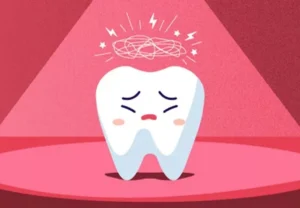Stress-Related Dental Issues can hurt your teeth and gums. Many people do not realize how stress affects their oral health. From teeth grinding to sore gums, stress creates problems that can lead to serious dental issues. Here, you will learn about how stress impacts your mouth and what you can do to keep your smile healthy.
Key Takeaways
- Stress can lead to teeth grinding which damages teeth.
- Canker sores can appear more often when stressed.
- Dry mouth can happen due to stress, leading to more cavities.
- Poor oral hygiene is common during stressful times.
- Gum disease can worsen with high levels of stress.
For additional insights on how to maintain good dental health, consider reading about the importance of regular checkups.
How Stress Affects Your Teeth and Gums

Stress can make you feel anxious and tense. When you are stressed, you might not take care of yourself as well as you should. This can include neglecting your oral health. Stress can lead to different dental problems, and understanding these can help you take control of your health.
Teeth Grinding (Bruxism)
Many people grind their teeth when they feel Stress-related dental issues. This is called bruxism. Grinding can happen while you sleep or during the day. Over time, this can wear down your teeth. It can also cause pain in your jaw and headaches. If you notice that you grind your teeth, it is important to talk to your dentist. They can suggest ways to protect your teeth, like a mouthguard.
Canker Sores
Canker sores are small, painful sores that form in your mouth. Stress can cause these sores to appear. They can make eating and drinking uncomfortable. While they usually heal on their own, you can use over-the-counter treatments to ease the pain. It is best to avoid spicy or salty foods when you have canker sores.
Dry Mouth
Stress can also lead to dry mouth. When you feel stressed, your body may not produce enough saliva. Saliva helps to keep your mouth clean and can prevent cavities. A dry mouth can increase your risk of tooth decay and gum disease. Drinking more water and chewing sugar-free gum can help keep your mouth moist.
Gum Disease
Gum disease is another issue tied to stress. When you have Stress-related dental issues, you might forget to brush and floss. This can lead to plaque buildup on your teeth. Plaque can irritate your gums, causing them to be red and swollen. If not treated, gum disease can lead to tooth loss. Regular dental visits and good hygiene can help prevent gum disease.
Poor Oral Hygiene Habits

Stress-related dental issues often lead to neglecting your oral hygiene. When life gets busy or overwhelming, you might skip brushing or flossing. This can lead to bigger problems down the road. Not taking care of your teeth can result in cavities and gum disease.
Tips for Keeping Up with Oral Hygiene
- Set a Routine: Try to brush your teeth twice a day and floss daily. Setting a time for this can help make it a habit.
- Use Reminders: Put reminders on your phone or leave notes around your house. This can help you remember to care for your teeth.
- Make It Enjoyable: Play music or listen to a podcast while you brush. This can make the task feel less like a chore.
Common Symptoms of Stress-Related Dental Issues
- Increased teeth grinding
- Frequent headaches
- Higher incidence of canker sores
- Noticeable gum inflammation
The Importance of Regular Dental Visits
Visiting your dentist regularly is crucial, especially when you are under stress. Your dentist can spot problems before they get serious. They can also give you advice on how to manage stress-related dental issues.
What to Expect at Your Dental Visit
- Checkup: Your dentist will check for cavities, gum disease, and other problems.
- Cleaning: A dental hygienist will clean your teeth and remove plaque.
- Advice: You can ask questions about any concerns you have related to stress and dental health.
To maintain healthy teeth and gums, consider learning more about effective orthodontic treatments.
Managing Stress for Better Oral Health

Managing your Stress-related dental issues can help improve your overall health, including your dental health. Here are some simple ways to reduce stress in your life.
Exercise
Physical activity can help lower stress. Whether you go for a walk, ride a bike, or join a gym, moving your body can make you feel better. Regular exercise also helps improve your mood.
Relaxation Techniques
Try relaxation techniques like deep breathing, meditation, or yoga. These methods can help calm your mind and body. Taking a few moments each day to relax can help you feel less stressed.
Connect with Others
Talking to friends or family can help ease stress. Sharing your feelings with someone you trust can make you feel supported. You do not have to deal with stress alone.
Conclusion
Stress can lead to several oral health issues. From teeth grinding to sore gums, it is important to be aware of these problems. By managing your stress and keeping up with your dental care, you can protect your smile. Remember to visit your dentist regularly and talk to them about any concerns you have. Taking care of yourself is the best way to keep your teeth and gums healthy.
By understanding how stress affects your dental health, you can take steps to prevent it from impacting your smile. Stay proactive and make your oral health a priority. Your teeth and gums will thank you for it!
Additional Resources
If you feel overwhelmed by stress, consider reaching out to a professional for help. They can provide support and strategies to help you manage it better. Your mental health is just as important as your dental health. Take care of both for a happier, healthier you.
| Stress-Related Issue | Description | Prevention Tips |
|---|---|---|
| Teeth Grinding | Grinding teeth during stress | Use a mouthguard, practice relaxation techniques |
| Canker Sores | Painful sores appearing in the mouth | Avoid trigger foods, use topical treatments |
| Dry Mouth | Reduced saliva production | Stay hydrated, chew sugar-free gum |
| Strategies for Stress Management | Benefits | Tips |
|---|---|---|
| Exercise | Lowers stress and improves mood | Find activities you enjoy |
| Relaxation Techniques | Calms the mind and body | Try meditation or yoga |
| Social Connections | Provides support and reduces feelings of isolation | Schedule regular catch-ups with friends |
